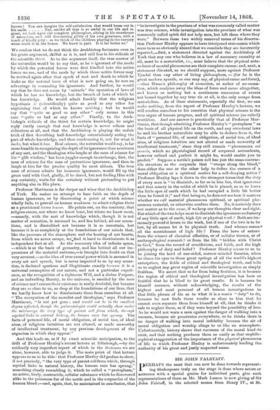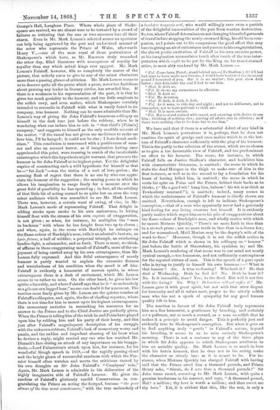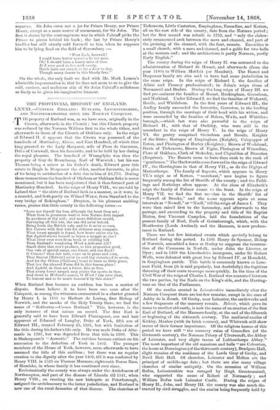SIR JOHN FALSTAFF.
PERHAPS the most that can now be done towards represent- ing Shakespeare truly on the stage is done where actors or actresses with a special genius for individual parts, give such representations of them as Mr. Mark Lemon is now giving of Sir John Falstaff, in the selected scenes from Henry Iv., at St. George's Hall, Lanham Place. Where whole plays of Shake- speare are revived, we are almost sure to be tortured by a crowd of failures so irritating that the one or two successes lose all their charm. Even in Mr. Mark Lemon's selected scenes no spectator can help being aggrieved by the pert and under-bred manner of the actor who represents the Prince of Wales, afterwards Henry V.,—one of the most royal of those portraitures of Shakespeare's which have, as Mr. Emerson truly remarked the other day, filled literature with conceptions of royalty far royaller than any which actual kings ever sgggest. Mr. Mark Lemon's Falstaff, however, fills so completely the centre of the picture, that nobody cares to give to any of the minor characters more than a passing glance of criticism. Mr. Mark Lemon seeing to us to deserve quite all the praise which a press, never too fastidious about praising any leader in literary circles, has awarded him. If there is a weakness in his representation of the part, it is that he gives too much geniality to the humour, and too little emphasis to the selfish envy, and even malice, which Shakespeare certainly intended to reconcile in Falstaff with what is rarely found in its company, true humour. Nothing can be more admirable than Mr. Lemon's way of giving Sir John Falstaff's humorous soliloquy on himself in the dark lane just before the robbery, when he is wondering what can induce him to rob in " that thief's [l'oin's] company," and suggests to himself as the only credible account of the matter, " if the rascal has not given me medicines to make me love him, I'll be hanged ; it could not be else ; I have drunk medi- cines." This conclusion is announced with a positiveness of man- ner and also an amused horror, as if imagination having once apprehended this point, were roaming in search of the incalculable catastrophes which this hypothesis might warrant, that presents the humour in Sir John Falstaff at its highest point. Yet the delightful caprice of constructing such a wild hypothesis for himself as that he—" fat Jack"—was the victim of a sort of love-potion ; the seeming flash of regret that there is no one by who can appre- ciate the humour of the suggestion ; the musing pause in which he allows his imagination to range freely for a moment over the great field of possibility he has opened up ; in fact, all the subtlety of that little bit of acting seemed to us quite lost on even the very select audience which was assembled to see Mr. Mark Lemon. There was, however, a certain want of swing, of elan, in Mr. Mark Lemon's mode of representing Falstaff. That delight in adding stroke upon stroke to his own caricatures, iu letting himself float with the stream of his own rapture of exaggeration, is not given ; as when, for instance, he multiplies the " men in buckram" with whom he has fought from two up to eleven ; and when, again, in the scene with Bardolph he enlarges on the flame-colour of Bardolph's nose, calls it an admiral's lantern, an ignis fatuus, a ball of wildfire, a perpetual triumph, an everlasting bonfire-light, a salamander, and so forth. There is more, we think, of afflatus in these exaggerating moods of Falstaff's, more of the en- joyment of being carried away by his own extravagance, titan Mr. Lemon fully expressed. And this fitful extravagance of moody humour is partly wanted to explain the excessive flatness and wretchedness of his condition when the mood is off him. Falstaff is evidently a humourist of uneven spirits, in whose extravagance there is a dash of excitement, which Mr. Lemon scents to us rather to miss. On the other hand, he gives his low spirits admirably, and where Falstaff says that he is " as melancholy as a gib-cat or a lugged bear," no one can doubt it for a moment. The touches most finely given by Mr. Lemon are the quieter touches of Falstaff's soliloquies, and, again, the fire of chaffing repartee, where there is not time for him to mount up to his highest extravagances. His momentary anxieties in ransacking his resources for an answer to the Prince and to the Chief Justice are perfectly given. When the Prince is telling him of the trick he and Pains have played upon him by robbing him and his party of their booty, and this just after Falstaff's magniloquent description of his struggle with the unknown robbers, Falstaff's look of momentary worry and puzzle, and the sudden and impudent clearing of his brow when he devises a reply, might remind any one who has watched Mr. Disraeli's face during an attack of any importance on his bragga- docio,—Lord Palmerston's attack upon him, for instance, for his wonderful Slough speech in 1858,—of the rapidly passing cloud and the bright gleam of resourceful sauciness with which the Pre- mier himself often watches and meets the criticisms caused by his own draughts on Sir John Falstaff's " Cambyses' vein." Again, Mr. Mark Lemon is admirable in his delineation of the highly imaginative side of Falstaff's humour. He gives the candour of Falstaff's gloriously candid Conservatism in con- gratulating the Prince on acting the footpad, because "the poor abuses of the time want countenance," with the true melancholy of
a lamlator temporis acti, who would willingly save even a particle of the delightful immoralities of the past from wanton destruction. So, too, where Falstaff determines on not changing his soiled garments of travel before stopping the newly-crowned King, his old boon com- panion, and points out to his companions the good effect this may have in giving an air of enthusiasm and passion to his congratulations, the almost poetic exultation of Falstaff in his own creative power, as his imagination accumulates touch after touch of the true inter- pretation which ought to be put by the King on his travel-stained attire, is most ably rendered by Mr. Mark Lemon :-
"Pal.Come here, Pistol; stand behind me.—[To Shallow.] 0 ! if I had had time to have made new liveried, I would have bestowal the thousand.
pound I borrowed of you. But it is no matter ; this poor show doth bettor; this cloth infer the zeal I had to see him.
"Sled. It cloth so.
"Fat. It shows my earnestness in affection.
"She/. It doth so.
"Fat My devotion.
"Mal. It doth, it cloth, it doth.
"sal. As it were, to ride day and night ; and not to deliberate, not to
remember, not to have patience to shift me.
"Shut It is most certain.
"Fit/. But to stand stained with travel, and sweating with desire to see him ; thinking of nothing else ; putting all affairs else in oblivion ; as if there were nothing else to b3 done but to see him."
We have said that if there is a substantial defect of any kind in Mr. Mark Lemon's portraiture it is, perhaps, that he does not combine the spirit of grudge and even malice which is at the bot- tom of Falstaff's character sufficiently with the play of his humour.
This is due partly to the selection of the scenes, which are so chosen as to give a too favourable view of Falstaff, and too predominant an effect to his humour. The scene, for instance, in which Falstaff falls on Justice Shallow's character, and backbites him with characteristic bitterness, is omitted ; the scene in which he stabs the dead Hotspur in the thigh to make sure of him in the first instance, as well as in the second to lay a foundation for his boast of having killed him, is omitted ; the scene in which he vents his spite on Pains and the Prince, behind their backs as he thinks, (" He a good wit ! hang him, baboon ! his wit is as thick as Tewkesbury mustard !"), is omitted ; indeed, minify scenes in which the maliciousness of Falstaff's humour is chiefly shown are omitted. Nevertheless, enough is left to indicate Shakespeare's conception,—that of a man who apparently never had a genuinely kind feeling for any living creature but himself. It is evidently partly malice which urges him on to his pile of exaggerations about the flame-colour of Bardolph's nose, and wholly malice with which he taunts Mistress Quickly, " There's no more faith in thee than in a stewed prune ; nor no more truth in thee than in a drawn fox; and for womanhood, Maid Marian may be the deputy's wife of the ward to thee." Moreover, though it is not the selfish malice in Sir John Falstaff which is shown in his soliloquy on " honour" just before the battle of Shrewsbury, his cynicism is ; and Mr. Mark Lemon's rendering of that scene was to our mind not nearly cynical enough,—too humorous, and not sufficiently contemptuous
for the reputed virtues of men. This is the speech of a pure cynic who is trying to justify to himself his own baseness :—" What is that honour? Air. A trim reckoning! Who bath it ? Ile that died o' Wednesday. Doth he feel it? No. Doth he hear it? No. Is it insensible, then ? Yes; to the dead. But will it not live with the living? No. Why ? Detraction will not stiffia. it." Mr.
Lemon gave it with great spirit, but not with that utter disgust for humanity and all it values most, proper to the utterly selfish man who has not a spark of sympathy for any good human quality left in him.
The reaction in favour of Sir John Falstaff truly represents him as a fine humourist, a gentleman by breeding, and certainly not a poltroon, not so much a coward, as a man so selfish that he makes it a principle to avoid danger. This is perfectly just and evidently true to Shakespeare's conception. But when it goes on to find anything truly " gentle " in Falstaff's nature, beyond his breeding, it seems to us to miss entirely Shakespeare's meaning. There is not a sentence iu any of the three plays in which Sir John appears in which Shakespeare attributes to him an amiable quality. Mr. Mark Lemon is so much in love with his hero's humour, that he does not in his acting make the character as utterly base as it is meant to be. For in- stance, when Mistress Quickly has charged Falstaff with having
said that the Prince owed him a thousand pounds, and Prince Henry asks, " Sirralf, do I owe thee a thousand pounds?" Sir John turns round, according to Mr. Mark Lemon, with quite a genuine tenderness in his manner, and says, "A thousand pound, Hal ? a million ; thy love is worth a million ; and thou owest me thy love." Yet, it is evident that this, like the rest, is only a
repartee. Sir John cares not a jot for Prince Henry, nor Prince Henry, except as a mere source of amusement, for Sir John. The first is shown by the contemptuous way in which Falstaff picks the Prince to pieces behind his back ; the last by Prince Henry's kindlier but still utterly cold farewell to him when be supposes him to be lying dead on the field of Shrewsbury :-
"Poor Jack, farewell! I could have better spared a be ter man. Oh! I should have a heavy miss of thee If I were much in lore with vanity.
Death hi th not struck so fat a deer to-day, Though many dearer in this bloody fray."
On the whole, the.only fault we find with Mr. Mark Lemon's admirable impersonation is, that he does not seem to us to give the cold, envious, and malicious side of Sir John Falstaff's selfishness as finely as he gives his imaginative humour.




































 Previous page
Previous page